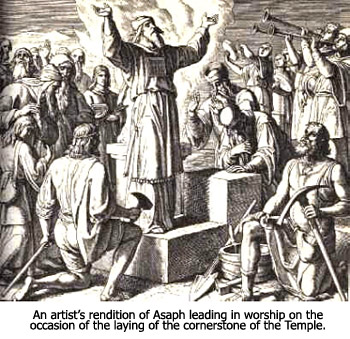Living with an Eternal Perspective
Thinking About Eternity

One of the greatest public servants in the history of England was William Gladstone (1809 – 1898) who served as Prime Minister four times during the latter half of the 19th Century.
Gladstone was a committed Christian who always attended church. He also taught a Sunday School class throughout his adult life. In fact, his aim early in his life was to become an Anglican clergyman, but after his graduation from Oxford, his strong-willed father insisted that he enter politics.1

Shortly before he died, Gladstone gave a speech in which he told about being visited by an ambitious young man who sought his advice about life. The lad told the elder statesman that he admired him more than anyone living and wanted to seek his advice regarding his career.2
A Remarkable Interview
“What do you hope to do when you graduate from college?” Gladstone asked.
The young man replied, “I hope to attend law school, sir, just as you did.”
“That’s a noble goal,” said Gladstone, “Then what?”
“I hope to practice law and make a good name for myself defending the poor and the outcasts of society, just as you did.”
“That’s a noble purpose,” replied Gladstone. “Then what?”
“Well, sir, I hope one day to stand for Parliament and become a servant of the people, even as you did.”
“That too is a noble hope. What then?” asked Gladstone.
“I would hope to be able to serve in the Parliament with great distinction, evidencing integrity and a concern for justice — even as you did.”
“What then?” asked Gladstone.
“I would hope to serve the government as Prime Minister with the same vigor, dedication, vision, and integrity as you did.”
“And what then?” asked Gladstone.
“I would hope to retire with honors and write my memoirs — even as you are presently doing — so that others could learn from my mistakes and triumphs.”
“All of that is very noble,” said Gladstone, “and then what?”
The young man thought for a moment. “Well, sir, I suppose I will then die.”
“That’s correct,” said Gladstone. “And then what?”
The young man looked puzzled. “Well, sir,” he answered hesitantly, “I’ve never given that any thought.”
“Young man,” Gladstone responded, “the only advice I have for you is for you to go home, read your Bible, and think about eternity.”
Good Advice
Think about eternity! What good advice. Life goes by so quickly. It is like a vapor that is here one moment and evaporates the next. We are preparing for eternity. Are you ready?
Or, are you living like you expect to live forever? Are you focused on this life, determined to accumulate all the money, power and fame you possibly can? Are you like the young man who visited Gladstone — are you a person who has never given eternity a thought? If so, the Word of God has a stern warning for you (James 4:13-15):3
And now I have a word for you who brashly announce, “Today — at the latest, tomorrow — we’re off to such and such a city for the year. We’re going to start a business and make a lot of money.”.
You don’t know the first thing about tomorrow. You’re nothing but a wisp of fog, catching a brief bit of sun before disappearing.
Instead, make it a habit to say, “If the Master wills it and we’re still alive, we’ll do this or that.”
The Fleeting Nature of Life
This passage always reminds me of an incident that occurred in my life several years ago. A dear friend of mine whom I had taught with in a Texas college called me one day and told me he had been diagnosed with prostate cancer.
“The doctor has given me only six months to live,” he reported.
I told him I was very sorry to hear the news, and I promised to pray for him and his family. Then, I added, “But keep in mind, I may be dead before you.”
“Oh? Do you have cancer too?” he asked.
“No,” I responded, “it’s just that I do not have the promise of even one day of life, much less six months.”
We all tend to live like we are going to live forever, when the fact is that we are all mortal and can die at any moment from a thousand different causes, natural or accidental.
Ironically, the Bible tells us that we are to live like we are going to live forever — but not on this earth. We are to live in preparation for eternity, hopefully an eternity with God.
“…he who hates his life in this world shall keep it to life eternal.” Jesus in John 12:25.
Most likely you are a born-again believer who has given serious thought to eternity, but who finds it difficult to maintain an eternal perspective. You repeatedly find yourself caught up with the problems of life, and the result is stress, anxiety, and even depression.
Living with an eternal perspective is one of the keys to living as an overcomer. It is a virtue that is going to become increasingly important as society continues to disintegrate and Christians come under increasing attack.
What is the secret to maintaining an eternal perspective? Much of the answer lies in your attitude about this world.
Your Attitude Toward the World
Stop for a moment and think. What is your attitude about this world? Are you enthusiastic about it? Or do you feel uncomfortable with it? Do you love the world? Or do you often feel alienated from it? Are you at home in this world? Or do you feel like a stranger?
There’s an old Negro spiritual song that always challenges me to examine my attitude toward the world. The first verse goes as follows:4
This world is not my home,
I’m just a passing through.
My treasures are laid up
Somewhere beyond the blue.
The angels beckon me
From heaven’s open door,
And I can’t feel at home
In this world anymore.
Do those words express your feeling about this world? What word would you use to summarize your feeling? Zealous? Anxious? Enamored? Estranged? Are you comfortable or do you feel ill-at-ease?
My Attitude
Let me ask your indulgence for a moment as I share my personal feeling about this world. The word I would use is “hate.” Yes, I hate this world. I hate it with a passion so strong and so intense that I find it difficult to express in words.
Now, let me hasten to clarify my feeling by stating that I do not hate God’s beautiful and marvelous creation. I have been privileged to see the majesty of the Alps. I have been awed by the rugged beauty of Alaska. I never cease to be amazed by the creative wonders of God in the great American Southwest. I have been blessed to see the incredible beauty of Cape Town, South Africa. And I have been overwhelmed time and time again by the stark and almost mystical bareness of the Judean Wilderness in Israel.
When I say that I “hate” this world, I’m not speaking of God’s creation. I’m speaking, instead, of the evil world system that we live in. Let me give you some examples of what I’m talking about:
- I hate a world where thousands of babies are murdered every day in their mother’s wombs.
- I hate a world where young people in the prime of life have their lives destroyed by illicit drugs.
- I hate a world that coddles criminals and makes a mockery of justice.
- I hate a world that glorifies crime in its movies and television programs.
- I hate a world that applauds indecent and vulgar performers like Lady Gaga.
- I hate a world where government has converted gambling from a vice to a virtue.
- I hate a world in which professional athletes are paid millions of dollars a year while hundreds of thousands sleep homeless in the streets every night.
- I hate a world where people judge and condemn one another on the basis of skin color.
- I hate a world that calls evil good by demanding that homosexuality be recognized as a legitimate, alternative lifestyle.
- I hate a world in which mothers are forced to work while their children grow up in impersonal day care centers.
- I hate a world in which people die agonizing deaths from diseases like cancer and AIDS.
- I hate a world where families are torn apart by alcohol abuse.
- I hate a world where every night I see reports on the television news of child abuse, muggings, kidnappings, murders, terrorism, wars, and rumors of wars.
- I hate a world that uses the name of my God, Jesus, as a curse word.
I hope you understand now what I mean when I say, “I hate this world!”
Jesus’ Viewpoint
But how I personally feel about this world is not important. The crucial point for you to consider is the biblical view. Let’s look at it, and as we do so, compare the biblical view with your own.
Let’s begin with the viewpoint that Jesus told us we should have. It is recorded in John 12:25 — “He who loves his life loses it, and he who hates his life in this world shall keep it to life eternal.”
Those are strong words. They are the kind that cause us to wince and think, “Surely He did not mean what He said.” But the context indicates that Jesus meant exactly what He said. So, what about it? Do you hate your life in this world or do you love it?
The Viewpoint of the Apostles
The apostle Paul gave a very strong warning about getting comfortable with the world. In Romans 12:2 he wrote: “Do not be conformed to this world, but be transformed by the renewing of your mind.” How do you measure up to this exhortation?
Are you conformed to the world? Have you adopted the world’s way of dress? What about the world’s way of speech or the world’s love of money? Are your goals the goals of the world — power, success, fame, and riches?
The brother of Jesus expressed the matter in very pointed language. He said, “Do you not know that friendship with the world is hostility toward God? Therefore, whoever wishes to be a friend of the world makes himself an enemy of God” (James 4:4).
Are you a friend of the world? Are you comfortable with what the world has to offer in music, movies, television programs and best selling books? Friendship with the world is hostility toward God!
In fact, James puts it even stronger than that, for at the beginning of the passage I previously quoted (James 4:4), he says that those who are friendly with the world are spiritual adulterers.
The apostle John makes the same point just as strongly in 1 John 2:15-16:
Do not love the world, nor the things in the world. If anyone loves the world, the love of the Father is not in him. For all that is in the world, the lust of the flesh, and the lust of the eyes, and the boastful pride of life, is not from the Father, but is from the world.
There is no way to escape the sobering reality of these words. Do you love the world? If so, the love of the Father is not in you!
The Focus of Your Mind
Paul tells us how to guard against becoming comfortable with the world. In Colossians 3:2 he says, “Set your mind on the things above, not on the things that are on earth.” In Philippians 4:8 he expresses the same admonition in these words:
Finally, brethren, whatever is true, whatever is honorable, whatever is right, whatever is pure, whatever is lovely, whatever is of good repute, if there is any excellence and if anything worthy of praise, let your mind dwell on these things.
As these verses indicate, one of the keys to living a triumphant life in Christ — to living a joyous and victorious life in the midst of a world wallowing in despair — is to live with a conscious eternal perspective.
What does that mean? In the words of Peter, that means living as “aliens and strangers” in this world (1 Peter 2:11). Similarly, in the words of the writer of Hebrews, it means living as “strangers and exiles.” (Hebrews 11:13). Paul put it this way: “Do not set your minds on earthly things, for our citizenship is in heaven” (Philippians 3:19-20).

The great Christian writer, C. S. Lewis, explained that to live with an eternal perspective means “living as commandos operating behind the enemy lines, preparing the way for the coming of the Commander-in-Chief.”5
A Biblical Example
There is a powerful biblical example of what can happen when a believer gets his eyes off the Lord and starts focusing on transient things rather than eternal matters. It is found in Psalm 73.
All students of the Bible are familiar with Psalm 51 in which David confessed his sin of adultery with Bathsheba. But few seem to be aware of Psalm 73 which contains the confession of David’s worship leader, Asaph.
In this remarkable psalm, Asaph confesses that he almost lost his faith when he lost his eternal perspective. It happened when he did something that all of us tend to do from time to time — namely, he took his eyes off the Lord and put them instead on the wicked. When he did so, he noticed the prosperity of the wicked and began to wonder if his devotion to God was really worth the effort (Psalm 73:1-3).
Has that ever happened to you? Surely it has. I think it has happened to all of us from time to time.
Struggling with the Prosperity of the Wicked
It’s the end of the month, and the bills are due. You’re sitting at your desk writing check after check. Suddenly, you reach that minimum balance you must maintain in order to pay the daily bills of the new month — food, gasoline, clothing, repairs, etc. But you still have a stack of bills to pay! You sigh in exasperation, wondering when you will ever be able to catch up with what you owe.
As you sit there staring dejectedly at your meager balance, you begin to think about a friend of yours at work. He is a vain and profane man, with a mouth like a sewer. He could care less about God. He is unfaithful to his wife. He ignores his children. He is consumed with sports and gambles constantly. Yet, he never seems to have a worry. He lives in a beautiful house, drives a fancy car, and eats at the finest restaurants.
Your heart begins to fill with envy and anger. You feel like crying out, “Lord, I serve You faithfully, and all I ever seem to get in return is trouble. My colleague at work is a complete reprobate, and he doesn’t seem to have a worry in the world! What’s wrong? Am I spinning my wheels with You? Is my tithe a waste of my money? Is my faithfulness of no concern to You? The way things are going, I might as well serve the devil and get some enjoyment out of life!”
Sound familiar? Well, this is exactly what happened to Asaph. He lost his eternal perspective, got his eyes on the wicked, and started wallowing in self-pity (Psalm 73:2-3).
Asaph’s Sin
It’s amazing how irrational we become when we allow self-pity to take over our thinking. When it happened to Asaph, he started fantasizing about the rich. He began to tell himself that they are “always at ease,” always increasing in wealth, never facing the problems of other people (Psalm 73:4- 5,12). All of which, of course, is utter nonsense. In fact, the opposite is true. The rich often tend to have far more problems than other people. For one thing, they must constantly be concerned about their money — how to protect it and multiply it.
It was while Asaph was caught up in this fantasy world that he committed a grievous sin against God. He blasphemed the love and faithfulness of God by exclaiming: “Surely in vain I have kept my heart pure and washed my hands in innocence; for I have been stricken all day long and chastened every morning” (Psalm 73:13-14).
Asaph’s Turning Point
Asaph was literally on the verge of losing his faith. His spirit was in turmoil. He was wrestling with monstrous doubt. The wrestling match continued until… “Until I came into the sanctuary of God; then I perceived their end [the end of the wicked]” (Psalm 73:17).

Asaph is maddeningly vague at this point. He does not tell us what happened to him when he went to the Lord’s house, except that his eternal perspective was restored. Was it a song that touched his heart? Could it have been a scripture reading or a sermon? Perhaps it was a word of encouragement from a discerning friend. It might even have been a death in his family. We just don’t know. All we know for sure is that something touched his heart and reminded him of the eternal destiny of the wicked.
He states that he was reminded that the wicked walk in “slippery places” and that God may cause them to be cast down at any moment, being swept away by “sudden terror” (Psalm 73:18-19). In other words, Asaph was reminded that life is very tentative — here one moment and gone the next.
The Impact of Death
I think this is the reason that the death of Princess Diana had such an enormous impact on the world. Here was a woman who had it all — everything the world dreams of having. She had beauty, charm, wealth, fame, and influence. She had the “good life.” Yet, in one terrifying moment, it all disappeared. She was reduced to equality with all of us — a mortal person gone to meet her Creator.
It was a sobering event. It drove home the transitory nature of life. I’m sure it caused many people to pause and think about eternity for the first time in their lives.
The Bible says that most people live in life-long fear of death. In fact, the Bible puts it even stronger than that. It says that most people live in “slavery” to the fear of death (Hebrews 2:15). This is the reason that a death in the family, or the death of a friend or a celebrity, always has such an impact. It reminds us of our mortality, and it triggers our eternal perspective.
Asaph’s Faith Restored
I think it is interesting to note that once Asaph’s eternal perspective was restored, he looked back on his combat with doubt and marveled over how stupid he had been. He concluded that he was as “senseless and ignorant” as a beast (Psalm 73:21-22).
Asaph wrapped up his psalm by praising the Lord for His faithfulness in words reminiscent of Paul when he wrote, “If we are faithless, He remains faithful; for He cannot deny Himself” (2 Timothy 2:13).
Asaph expressed his restored priorities in memorable words (Psalm 73:25-28):
Whom have I in heaven but You?
And besides You, I desire nothing on earth.
My flesh and my heart fail,
But God is the strength of my heart and my portion forever.
For, behold, those who are far from You will perish;
You have destroyed all those who are unfaithful to You.
But as me, the nearness of God is my good;
I have made the Lord God my refuge,
That I may tell of all Your works.
The solution to Asaph’s spiritual agony was the restoration of his eternal perspective. He was reminded that this life is fleeting, and a day of judgment is coming. He realized that he may never see justice in this life, but one day justice will prevail. He realized that he had been called to live by faith and not by sight.
Another Test of Attitude
Let me give you one last test for determining whether or not you are living with an eternal perspective: How do you feel about the Lord’s return? This is an acid test that will determine whether you are in love with the world or the Lord.
The attitude of the person who is in love with the world can best be expressed in these words: “I want the Lord to return, but…” There is always a “but.”
- “I want the Lord to return, but I want Him to come after I have made a million dollars.”
- “I want the Lord to come, but I want Him to come after I’ve written a great novel.”
- “I want the Lord to come, but I want Him to come after I’ve made the cover of Time.”
- “I want the Lord to come, but I want Him to come after I’ve built a great church.”
- “I want the Lord to come, but I want Him to come after I’m 85 years old and have experienced all that life has to offer.”
What these people are really saying is, “I want Jesus to come, but I don’t want Him messing up my life!” They are in love with the world.
You see, when you are in love with someone, you want to be with them. That’s a fact of life. Watch people who have just fallen in love. They want to be with each other all the time. When they are apart, they are constantly on the phone talking about when they will be together again!
The same is true of the Lord. If you truly love Jesus, you will want to be with Him. You will talk with Him in prayer. You will fellowship with Him in His Word and in worship. But these forms of communication will never satisfy your longing to be in His presence, to have personal, intimate fellowship with Him, face to face.
You will be like Paul, willing to stay on in this world serving the Lord, but yearning for the day when you will be united with Him, either through death or His return (2 Corinthians 5:8 and Philippians 1:23-24).
A Practical Suggestion
I suggest that the next time you let your eternal perspective slip, remember Psalm 73 and read it. When you finish, reverse the numbers and go to Psalm 37. There you will find a powerful summary of what Asaph learned. It is a psalm of Asaph’s mentor, King David.
David says, “Do not fret because of evildoers… for they will wither quickly like the grass and fade like the green herb” (verses 1-2). He tells us what to do instead: “Trust in the Lord, and do good… delight yourself in the Lord” (verses 3-4). Over and over again he warns us not to fret over evildoers, for he says the day will come when they will be “cut off” (verse 9). In contrast, “those who wait upon the Lord” shall “inherit the earth” (verse 9).
What is Your Attitude?
Are you focused on this world? Are you attached to it, or do you have a sense of the fact that you are only passing through, heading for an eternal home?
This life is transitory. This life is only a prelude to eternity. The song writer, Tillit S. Teddlie, put it all in perspective when he wrote:6
Earth holds no treasures
But perish with using,
However precious they be;
Yet there’s a country
To which I am going:
Heaven holds all to me.
Why should I long
For the world with its sorrows,
When in that home o’er the sea,
Millions are singing
The wonderful story?
Heaven holds all to me.
Heaven holds all to me,
Brighter its glory will be;
Joy without measure
Will be my treasure:
Heaven holds all to me.
There is a more contemporary song that sums up the whole essence of what it means to live with an eternal perspective:7
Turn your eyes upon Jesus,
Look full in His wonderful face,
And the things of earth
Will grow strangely dim
In the light of His glory and grace.
A number of years ago I was given the blessing of meeting a great man of God named Leonard Ravenhill, a prophetic preacher from England. After our meeting, we corresponded briefly. Right before he died, in the last letter he sent me, he enclosed a small card containing a brief, one sentence message. He urged me to memorize the message and live it daily.
That was July of 1988. I still have the card. It is worn and tattered because I have made it a point to keep it in my shirt pocket at all times. The message printed on it is simple but profound: “Lord, keep me eternity conscious.”
Notes
1) Roy Jenkins, Gladstone: A Biography (New York, New York: Random House, 1997), 768 pages.
2) There are many versions of this conversation that circulate on the Internet, all making the same point. The version reproduced here is a composite prepared by the author.
3) Eugene H. Peterson, The Message (Colorado Springs, Colorado: Navpress, 2002), p. 572.
4) Albert Brumley, “This World is Not My Home (I’m Just A Passing Thru),” a Negro spiritual of unknown origin arranged by Albert E. Brumley. Arrangement © by Albert E. Brumley.
5) The author was unable to locate the precise source of this quotation that is attributed to C. S. Lewis. Lewis refers several times to “living on enemy territory” in his classic, Mere Christianity, (New York, New York: MacMillan Publishing Co., 1960), p. 51.
6) Tillit S. Teddlie, “Heaven Holds All for Me,” public domain.
7) Helen H. Lemmel, “Turn Your Eyes Upon Jesus,” © 1922, renewed 1950 by Singspiration, Inc.
This article is abbreviated from a chapter contained in Dr. Reagan’s book, Living for Christ in the End Times.




